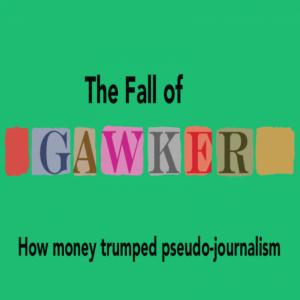The Fall of Gawker
The Fall of Gawker.
How money trumped psuedo-journalism.
It was serendipity.
This weekend I read Ryan Holiday’s book, “Trust Me I’m Lying: Confessions of a Media Manipulator”, which detailed how blogs like Gawker, Buzzfeed and The Huffington Post drive, and manipulate, the current media agenda.
After a particularly brazen segment, I pulled out my phone for a quick, online fact check on Gawker. Lo and behold, the enfant terrible site known for pseudo-journalism and stinging gossip pieces, was shutting down. The next day. The reason for its demise? A 140 million dollar lawsuit launched by ex-wrestler Hulk Hogan.
Was this a case of a celebrity successfully pushing back against a news outlet that spread rumours faster than an STD? Or did a billionaire with a grudge deliver final comeuppance?

The Gawker era
Walter Cronkite, and a thousand journalists after him, are surely rolling in their graves today. A small percentage of news we consume is driven by actual, let alone factual, events. In our online world, it’s about headlines and clicks and filling the never ending space. Gawker’s take on this? If there is even a hint of truth to the piece, get it out there. Find the angle. Fact check later.
What Holiday’s book morbidly discussed is how a rumour or corrupted story can start at a lower level blog and make its way up the chain to a national media outlet in a flash, and no one polices the actual content. Holiday provided examples of where he personally manipulated this chain – playing both sides of the coin – and sat back to watch the results.
There was a hollow space in my gut reading how he did this. There are tools anyone can use to manipulate content. And we’re consuming more and more manipulated content. Without asking questions. Ever. Gawker and other bloggers rely on this. Earlier this year Facebook hired three thousand temporary staff to scour their site and eliminate fake news and extremist posts. It’s a problem.

How big is the problem?
Huge. Newspapers are dying. Online blogs dominate. Where else do we turn for news? And with attention spans at all time lows – average focus time is now estimated to be ten seconds – it’s not even about actual news anymore. It’s about getting people’s attention. This is what Gawker was so good at.
It was the online version of a reality TV show where the messier and uglier and sordid the tale, the better. Craft a catchy headline, toss in a big celebrity name, mix in some trending key words and its insta-news.
Even when Gawker was pushed to defend their pieces – instances where actual companies or people fought back against outlandish claims – any retractions were printed below the original article. In other words, no one read them.
It’s troubling for any person or company to be at the behest of such a machine. Holiday’s book detailed being woken up at 6 am by a Gawker journalist asking if he wanted to comment on a piece about then-employer American Apparel. The kicker? Comment or not, the piece was going online within thirty minutes.
Is there a way to stop this insanity?
The short answer is no.
Money is power and the interesting end to Gawker’s story comes in the form of billionaire Peter Thiel, founder of PayPal. The site hinted Thiel was gay several years prior and this outraged him. Cue the path to destruction. Thiel backed the Hogan lawsuits against Gawker (the site published excerpts from a sex video Hogan was involved in) and the verdict proved too costly.
The irony? Thiel is one of silicon valleys most successful entrepreneurs and venture capitalists. Blogs like Gawker are often created in the hopes of being sold to one of the big media giants via transactions that VC companies facilitate, and profit from. The thinly veiled cycle of corruption (and enabling) is scary.

How to cope in a Pseudo-news world
Real news? Forget it. Content is now created to generate revenue and eyeballs. It’s Pageviews. SEO. Followers. CPM. We feed the machine every day in a Pavlovian way, herded towards posts that are popular, liked, re-tweeted. Validation by others must mean it’s right, right? I don’t have to outline what a slippery slope this is.
Blindsiding people or companies with inflammatory stories and content, forcing them on their back heels, is now commonplace in every industry. Stock-shorters release reports they are short a certain stock and the price tumbles. For Holiday, he battled endless smear campaigns against American Apparel and its founder Dov Charney. (FYI…I’m not pro or con Charney. I only know what I’ve read about him online, ‘natch.)

Fact or Fiction?
In conclusion, it’s not news that money rules the world. What’s interesting about the fall of Gawker is that the very system that’s creating today’s news (and one of the faces behind it) got offended and took Gawker down just because they could. Where does this leave the state of online news?
Holiday’s book was fascinating because it showed how anyone who spends time to figure out the current online media game can fight back and rig it in their favour.
My advice?
The next time you click on a juicy headline and want to share it, think twice.
What exactly are you spreading?



